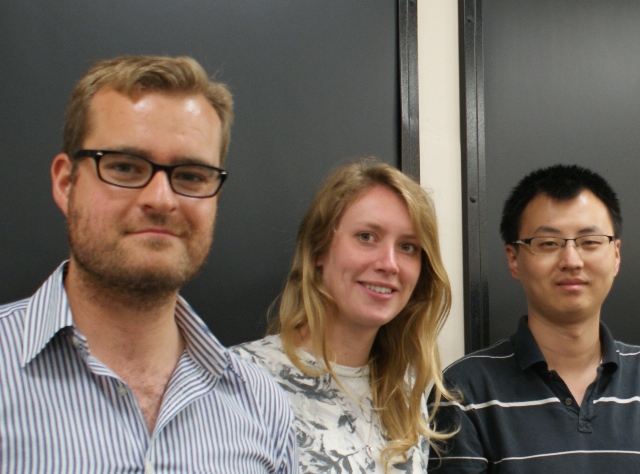May 29 2015
Scientists and engineers from the University of Bristol, UK, and the Centre for Quantum Technologies in Singapore have published work in the June issue of Optica. They demonstrate a new protocol for estimating unknown optical processes, called unitary operations, with precision enhanced by the unique properties of quantum mechanics. This could lead to both dramatically better sensors for medical research and new approaches to benchmark the performance ultra-powerful quantum computers.
 Left to Right: Jonathan Matthews, Beccie Whittaker and Xiao-Qi Zhou
Left to Right: Jonathan Matthews, Beccie Whittaker and Xiao-Qi Zhou
History tells us the ability to measure parameters and sense phenomena with increasing precision leads to dramatic advances in identifying new phenomena in science and improving the performance of technology — famous examples include X-ray imaging, magnetic resonance imaging (MRI), interferometry and the scanning-tunneling microscope. Researchers’ in an international effort are rapidly growing understanding of how to engineer and control quantum systems to vastly expand the limits of measurement and of sensing. This area, known as quantum metrology, promises to open up opportunities in radically alternative methods to the current state of the art in sensing.
The authors here have re-directed the sensing power of quantum mechanics back on itself, to characterize with increased precision unknown quantum processes that can include individual components used to build quantum computers. This ability is becoming more and more important as quantum technologies move closer to real applications.
“A really exciting problem is characterizing unknown quantum processes using a technique called quantum process tomography”, said Dr Xiao-Qi Zhou. “You can think of this as a problem where a quantum object, maybe a photonic circuit of optics, or an atomic system, is locked in a box. We can send quantum states in and we can measure the quantum states that come out. Our challenge is to correctly identify what is in the box. This is a difficult problem in quantum mechanics and it is a highly active area of research because its solution is needed to enable us to test quantum computers as they grow in size and complexity.”
One major shortcoming of quantum process tomography is that the precision using standard techniques is limited by shot-noise—this is why the authors have borrowed techniques from quantum metrology to demonstrate precision beyond the shot noise limit. They expect their protocol can also be applied to build more sophisticated sensors that identify molecules and chemicals more precisely, by observing how they interact with quantum states of light.
“The optical process we measured here can be used to manipulate quantum bits of information in a quantum computer, but they can also occur in nature. For example, our setup could be used to measure how the polarization of light is rotated by a sample. We can then infer with better precision properties of that sample” said PhD student Rebecca Whittaker. “Increasing measurement precision is particularly important for probing light-sensitive samples, where we want to get as much information as we can before our probe light damages or alterations to the sample. We feel this will have a big impact on the tools used in medical research.”
The authors’ protocol relies on generating multiple photons in an entangled state. The authors demonstrate that they can reconstruct rotations that act on the polarization of light. The research is published today in Optica.